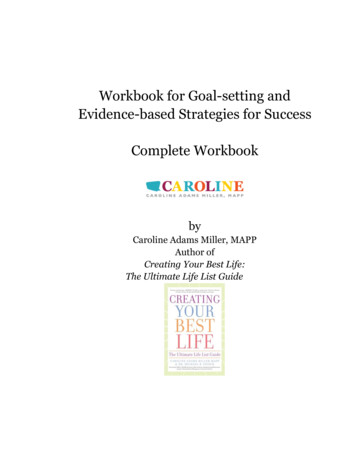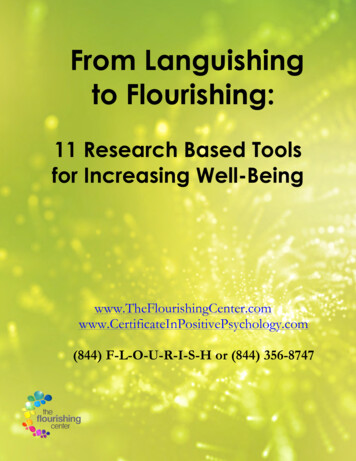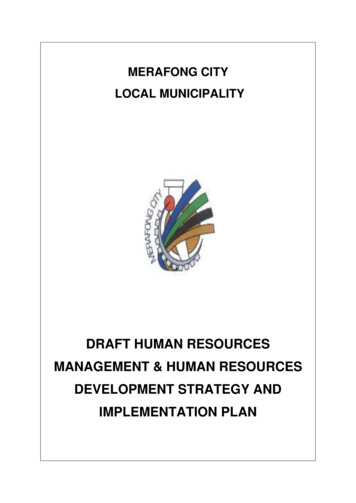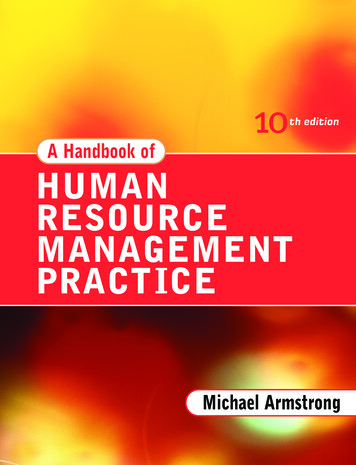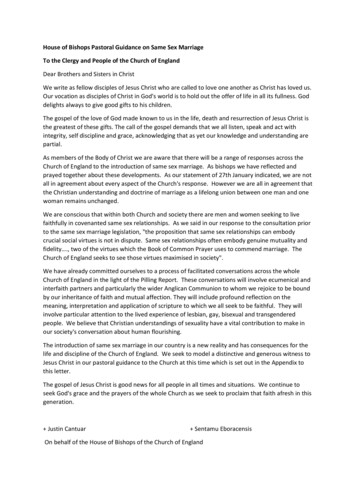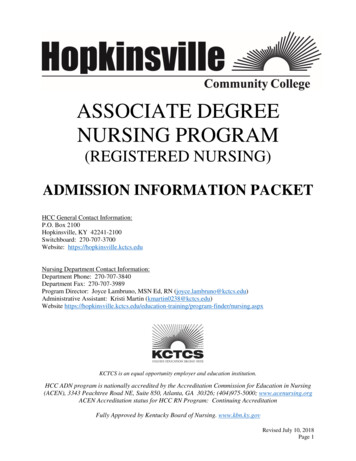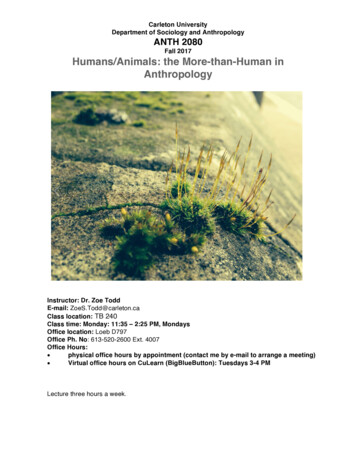
Transcription
BIBLE SOCIETYBIBLE STUDIESHUMANFLOURISHINGLEADERS NOTESINTRODUCTIONIn this set of four studies, we will examine key passages fromHere is a fresh idea from the Bible Society: some material tothe Gospel of Mark, to see how Jesus shows us what it meanshelp you open up the Bible with a friend or neighbour, and goto become a flourishing human being. The important thing toon a one month journey toward greater flourishing.realise is that we do not become flourishing human beings onour own, it always happens in community. We need others, andThe commitment is just one hour, once a week, for one month.they need us.The outcomes will be eternal!These studies are a companion to a 14 day Daily Bible Series,Jesus said that he came to earth to give us life, and life to thewhich you can find online here: bible.com.au.full (John 10:10). What does that full life look like? Is it something we can only achieve in heaven, after we die?These studies will go deeper into four key texts, stretching ourunderstanding, and challenging us to begin living a flourishingIs it simply a spiritual experience?life.For a long time, I thought the full life Jesus spoke about was aAUTHOR:spiritual flourishing I would only experience in heaven. Howev-Kara Martin is the author of Workship: How to Use your Worker, the more I learn about Jesus and his mission, I see that heto Worship God, and Workship 2: How to Flourish at Work andcame to model a flourishing life on earth, that continues intowas co-editor of Transforming Vocation: Connecting Theology,eternity. Christianity is not merely a set of beliefs, or even justChurch, and the Workplace for a Flourishing World. She is aa set of behaviours based on beliefs. It is a way of life, but morelecturer with Alphacrucis College, and Adjunct Professor withthan that, it is a way of becoming.Gordon-Conwell Theological Seminary, Boston. She is also onthe Board of the Karam Fellowship (US).Scripture quotations taken from the Holy Bible,New International Version TM, NIV TMCopyright 1973, 1978, 1984, 2011 by Biblica, Inc.Used with permission. All rights reserved worldwide.
STUDY 1HOW JESUSIS THE MODELFOR HUMANFLOURISHINGOPENING QUESTION:Do you think of Jesus as more God, or more man?Give a reason for your answer.READ PHILIPPIANS 2:5–11 TM5In your relationships with one another, have the same mind-set as Christ Jesus:6who, being in very nature God,did not consider equality with God something to be used tohis own advantage;7rather, he made himself nothingby taking the very nature of a servant,being made in human likeness.8And being found in appearance as a man,he humbled himselfby becoming obedient to death –even death on a cross!9Therefore God exalted him to the highest placeand gave him the name that is above every name,10DISCUSS:What do you notice from thisdescription about Jesus beingboth God and man?that at the name of Jesus every knee should bow,in heaven and on earth and under the earth,11and every tongue acknowledge that Jesus Christ is Lord,to the glory of God the Father.OPEN THEBIBLEWITH YOURSTUDY 1
INTRODUCTIONhe ate locusts and wild honey. 7 And this was his message:This passage helps us understand that Jesus was both fully‘After me comes the one more powerful than I, the straps ofGod and fully human. It reveals to us that Jesus came inwhose sandals I am not worthy to stoop down and untie. 8 Ihuman form to be born, live, die, and rise again, to enablebaptise you with water, but he will baptise you with the Holyus to be restored in relationship with God. Since Jesus wasSpirit.’without sin (2 Corinthians 5:21), he is the one and only truehuman. He shows us what it means to be human in all itsThe baptism and testing of Jesusglory, to be a flourishing human.9At that time Jesus came from Nazareth in Galilee and wasbaptised by John in the Jordan. 10 Just as Jesus was comingIn these four Bible Studies, we will look at some of the keyup out of the water, he saw heaven being torn open and theaspects of Jesus’ teaching and behaviour which demonstrateSpirit descending on him like a dove. 11 And a voice camewhat it means to live life to the full.Notice what it says in versefrom heaven: ‘You are my Son, whom I love; with you I am well5: “In your relationships with one another ” All that we learnpleased.’in these studies only makes sense lived out in community,12in all the messy relationships around us, including with ourwas in the wilderness for forty days, being tempted by Satan.neighbours.He was with the wild animals, and angels attended him.Let’s start with who wrote the Gospel of Mark. Mark isJesus announces the good newsidentified widely as John Mark (mentioned in Acts 12–15),14who met Peter as he came out of prison, and accompaniedproclaiming the good news of God. 15 ‘The time has come,’ hePaul on his missionary journeys. He is believed to be Mark,said. ‘The kingdom of God has come near. Repent and believecousin of Barnabas, affirmed by Paul (Colossians 4:10 and 2the good news!’At once the Spirit sent him out into the wilderness, 13 and heAfter John was put in prison, Jesus went into Galilee,Timothy 4:11), and commended by Peter (1 Peter 5:13).Although he was not an eyewitness of Jesus’ life, it isaccepted that Mark is capturing Peter’s account of Jesus, andof course, Peter was one of Jesus’ inner circle of disciples.CONTEXTFirstly, note the titles for Jesus that Mark uses: “Jesus theMessiah, the Son of God”. He leaves no doubt that the manTo live a flourishing life, the first thing we need to learn aboutJesus he is talking about is also God. In fact, Jesus is theis repentance.promised Messiah, the anointed One, spoken about by theprophets. Under his reign, there is to be flourishing on earthREAD MARK 1:1–15 TM1(you can read more in Isaiah 61).The beginning of the good news about Jesus the Messiah,the Son of God, 2 as it is written in Isaiah the prophet:‘I will send my messenger ahead of you,who will prepare your way’ –3‘a voice of one calling in the wilderness,“Prepare the way for the Lord,make straight paths for him.”’4And so John the Baptist appeared in the wilderness,preaching a baptism of repentance for the forgiveness ofsins. 5 The whole Judean countryside and all the people ofJerusalem went out to him. Confessing their sins, they werebaptised by him in the River Jordan. 6 John wore clothingmade of camel’s hair, with a leather belt round his waist, andOPEN THEBIBLEWITH YOURSTUDY 1
DISCUSSWhat are the key messages of John the Baptist and Jesus?When Jesus says, “believe in the good news” (v.15), whatHow would you define the word ‘repent’?does this look like?When I first became a Christian, I was taught that repentAs well as repenting, Jesus tells us to believe, but this is notmeans ‘turning back’. The idea was that we shouldmerely saying “yes” in your head.recognise that we had done wrong (sinned, fallen shortof God’s expectations), ask for forgiveness, and then turnJesus is inviting us into a new relationship with God. Withback from sin to God.all relationships, belief is linked to trust. If your parent saysto you, “I believe in you”, this is a significant statement. ItThere are some helpful thoughts there, but what I camemeans “I trust you”, “I believe you will be consistent in yourto learn later is a richer definition of repentance. Thebehaviour” and “I will act as if you are being your best self”.New Testament was written in Greek, and the wordIn the same way, we are to say to Jesus: “I believe in you. Ifor repentance is metanoia, which means “a new waytrust you with my whole life.”of looking at the world”. Literally it means “a changedmind and heart”. It is a fundamentally different way ofunderstanding God, yourself, other people, and the world.APPLICATION Does faith change the way you see everything?With this new way of looking, we realise that our everydaylives are biased away from God, like a lawn bowl on abowling green going away from the little white jack (ball). What areas of your life have changed since you became aChristian? Does faith change the way you see working? Money?We need forgiveness now, and to embrace a new wayRest? Eating? Parenting? Your relationship withof living, aligned with God. No wonder the immediateneighbours? response to repentance was baptism, with the whole body Are you trusting Jesus with every area of your life?washed clean. Do you pray about different areas of your life? Do you see Jesus as king of all you have and do?What do you think Jesus meant when he said, “the What have you been challenged by in this study?kingdom of God has come near” (v.15)?We often think of the kingdom of God as a future event,PRAYERsomething that will be established when Jesus returns.Start by praying for each other, particularly about theHowever, Jesus seems to be speaking in the present tense:areas of challenge.this kingdom “has come near”.Dear God,The better way of seeing it is that King Jesus has come,Thank you for sending John the Baptist who prepared theand wherever he goes, the kingdom is being established onway for King Jesus to come and establish his kingdom onearth. This kingdom is not geographical, it is made up ofearth.people who acknowledge that Jesus is king.Thank you for the invitation to see everything differently,So, Jesus is ushering in a new era which changes our waythrough the frame of faith.of seeing our relationship with God, and with the world. Itis a new way of understanding how our story is linked withHelp us to be washed clean of everything that might distractGod’s big story of creation, fall, Jesus’ coming, lookingus in our relationship with you. Help us to focus our heartsforward to the new creation.on loving you in every area of our lives.It helps us see all those around us—our neighbours, ourAmen.friends, our family, work colleagues—in fresh ways.OPEN THEBIBLEWITH YOURSTUDY 1
STUDY 2HUMAN FLOURISHINGIS MARKED BYABUNDANTHOSPITALITYOPENING QUESTION:When they found out, they said, ‘Five – and two fish.’Describe a time when you experienced wonderful39hospitality: a hotel, visiting people, a meal groups on the green grass. 40 So they sat down in groupsHow did that make you feel?of hundreds and fifties. 41 Taking the five loaves and the twoThen Jesus told them to make all the people sit down infish and looking up to heaven, he gave thanks and broke theREAD MARK 6:30–44 NIV TM30The apostles gathered round Jesus and reported to him allthey had done and taught. 31 Then, because so many peoplewere coming and going that they did not even have a chanceto eat, he said to them, ‘Come with me by yourselves to aloaves. Then he gave them to his disciples to distribute to thepeople. He also divided the two fish among them all. 42 Theyall ate and were satisfied, 43 and the disciples picked up twelvebasketfuls of broken pieces of bread and fish. 44 The numberof the men who had eaten was five thousand.quiet place and get some rest.’32So they went away by themselves in a boat to a solitaryplace. 33 But many who saw them leaving recognised themand ran on foot from all the towns and got there ahead ofthem. 34 When Jesus landed and saw a large crowd, he hadcompassion on them, because they were like sheep without ashepherd. So he began teaching them many things.35By this time it was late in the day, so his disciples cameto him. ‘This is a remote place,’ they said, ‘and it’s alreadyvery late. 36 Send the people away so that they can go to thesurrounding countryside and villages and buy themselvessomething to eat.’37But he answered, ‘You give them something to eat.’They said to him, ‘That would take more than half a year’swages! Are we to go and spend that much on bread and giveCONTEXTJesus has sent out the 12 disciples (Mark 6:6b–13), and theyhave been travelling around in pairs preaching, driving outdemons and healing people. King Herod has heard aboutthis and mistakenly assumes that Jesus is John the Baptistresurrected. This reaction is probably driven by guilt sinceHerod was responsible for John’s beheading (you can readabout that in verses 14–29).In verse 30 we read that the disciples have all gathered todebrief with Jesus, but they are being overwhelmed by crowdsof people. Jesus expresses a desire to get away with them sothat they can get some rest and he can finish the debriefing.it to them to eat?’38‘How many loaves do you have?’ he asked. ‘Go and see.’OPEN THEBIBLEWITH YOURSTUDY 2
DISCUSS:priests and kings who have led them astray. However, allWhat do verses 30–31 tell you about Jesus and histhe people are guilty of not recognising who God is.relationship with his disciples? What clues do we get forIn our Mark 6 reading, we see that the people are hungrythinking about Jesus as a model for Christian leadership?for the teaching of Jesus, but they are also physicallyhungry.In spite of Jesus’ plan, they get interrupted. Even in thissolitary place, the crowds gather. As in Mark chapter 5,Jesus is teaching the people, it is late, and they are far fromJesus allows himself to be interrupted.shops or homes. The disciples want to send the peopleaway, but Jesus, continuing in his training mode, challengesthem to solve the problem. However, the thinking of theWhat is Jesus’ motivation?disciples is controlled by the material world around them,Note: compassion literally means to “suffer with”—notrather than kingdom imagination: “That would take morejust meeting physical needs—but meeting their spiritual,than half a year’s wages! Are we to go and spend that muchemotional and mental needs.on bread and give it to them to eat?” (v.37)What is the significance of Jesus seeing them as “sheepWe now move onto the well-known miracle: the feeding of thewithout a shepherd”? What other Bible references come5,000. Sometimes our familiarity with this story might hideto mind?some important learning.What stands out in a fresh way in your reading of Jesus’READ JEREMIAH 50:1, 6–7 NIVTMmiraculous feeding of the people (vv.38–44)?This is the word the Lord spoke through Jeremiah theprophet concerning Babylon and the land of the Babylonians:6‘My people have been lost sheep;and five loaves of bread. He gives thanks God to for thetheir shepherds have led them astrayfood. Jesus doing this is significant, because we see himand caused them to roam on the mountains.doing it again later at the Last Supper. Then, the food isThey wandered over mountain and hilland forgot their own resting place.7Jesus takes charge and gathers the food available: two fishWhoever found them devoured them;their enemies said, “We are not guilty,for they sinned against the Lord, their verdant pasture,the Lord, the hope of their ancestors.”distributed, and there is abundance for all.The number of excess baskets is significant: 12 tribes ofIsrael, 12 disciples The number 12 signifies wholeness,and it also speaks to the generosity of God. He feeds usbeyond what we need. There is an abundance here which isindicative of the kingdom.God is speaking through the prophet Jeremiah to his peopleWhat difference does it make knowing that Christianswho have been carried away into captivity by Babylon.worship a God characterised by abundant hospitality?How do you see this mirrored in churches or Christianorganisations that you are familiar with?DISCUSSWho might the shepherds be?Rosaria Butterfield (who wrote The Gospel Comes Witha House Key: Practicing Radically Ordinary Hospitality inWho is responsible for the situation God’s people findOur Post-Christian World) takes this biblical pattern ofthemselves in?abundant hospitality and challenges us to apply it in ourown settings. She calls it “radical ordinary hospitality”The shepherds in this case are the leaders of Israel: theOPEN THEBIBLEWITH YOURwhich she defines as: “Using your Christian home in aSTUDY 2
daily way that seeks to make strangers neighbours, andPRAYERneighbours family of God When our Christian homes areStart by praying for each other, particularly about the areas ofopen, we make transparent to a watching world what Christchallenge.is doing with our bodies, our families, and our world.”Herpassion for hospitality comes from her own experience ofThank you, Jesus, for showing these people compassion.being befriended, welcomed into a Christian home, andThank you for demonstrating to us the abundance of thefinding out who Jesus is in a welcoming surrounding.kingdom, where we receive what we need to be satisfied, butstill there is more.In his book Reaching Out, Henri Nouwen talks abouthospitality in this way:Help us to show others what the kingdom is like.Help us to practice radical ordinary hospitality in our home,Hospitality is not to change people but to offer them spaceour neighbourhood, our workplace and in church.where change can take place. It is not to bring men andwomen over to our side, but to offer freedom not disturbedAmen.by dividing lines. It is not to lead our neighbour to a cornerwhere there are no alternatives left, but to open a widespectrum of options for choice and commitment. It is notan educated intimidation with good books, good stories,and good works, but the liberation of fearful hearts so thatwords can find roots and bear ample fruit.APPLICATION Do you practice abundant hospitality in your life? What inspires or stops you? Rosaria Butterfield says radical ordinary hospitality beginswith cooking more than you need for dinner and beingready to invite people to your table. Is that something youcould try with your neighbours? What have you been challenged by in this study?OPEN THEBIBLEWITH YOURSTUDY 2
STUDY 3HUMAN FLOURISHINGIS MARKED BYABUNDANT SACRIFICEOPENING QUESTION:The way of the crossHow would you describe Jesus to a non-Christian34neighbour in one sentence?said: ‘Whoever wants to be my disciple must deny themselvesHow would you describe Jesus to a Christian friend?and take up their cross and follow me. 35 For whoever wantsThen he called the crowd to him along with his disciples andto save their life will lose it, but whoever loses their life for meREAD MARK 6:30–44 NIV TMPeter declares that Jesus is the Messiah27Jesus and his disciples went on to the villages aroundCaesarea Philippi. On the way he asked them, ‘Who do peoplesay I am?’28They replied, ‘Some say John the Baptist; others say Elijah;and for the gospel will save it. 36 What good is it for someoneto gain the whole world, yet forfeit their soul? 37 Or whatcan anyone give in exchange for their soul? 38 If anyone isashamed of me and my words in this adulterous and sinfulgeneration, the Son of Man will be ashamed of them when hecomes in his Father’s glory with the holy angels.’and still others, one of the prophets.’29‘But what about you?’ he asked. ‘Who do you say I am?’Peter answered, ‘You are the Messiah.’30Jesus warned them not to tell anyone about him.Jesus predicts his death31He then began to teach them that the Son of Man mustsuffer many things and be rejected by the elders, the chiefpriests and the teachers of the law, and that he must be killedand after three days rise again. 32 He spoke plainly about this,and Peter took him aside and began to rebuke him.33But when Jesus turned and looked at his disciples, herebuked Peter. ‘Get behind me, Satan!’ he said. ‘You donot have in mind the concerns of God, but merely humanCONTEXTThis is the turning point of the Gospel of Mark. Although Markstarts the Gospel by declaring Jesus as the Messiah—theanointed one—everyone keeps wondering, “who is Jesus”?The disciples aren’t sure, the crowds aren’t sure, King Herodis speculating, and the religious leaders don’t really want toknow.Then Peter declares that Jesus is the Messiah, and from thismoment, Jesus starts heading towards Jerusalem for his finalshowdown with the religious authorities and his dying andrising.concerns.’OPEN THEBIBLEWITH YOURSTUDY 3
DISCUSS:How does Jesus describe what he is going to do asPeter declares Jesus is the Messiah, then immediatelyMessiah (Mark 6:31)?says something which earns a very stern rebuke fromJesus (v.33). How could Peter get it so wrong?You can understand Peter’s concerns at this point. Theycannot understand a Messiah who is going to suffer and beIn the first study I pointed out that Jesus is the promisedkilled.Messiah, the anointed One, spoken about by the prophets.Under his reign, there is to be flourishing on earth.Jesus uses their confusion to teach them an importantHowever, by the time of Jesus, there were many viewselement about what it means to live a flourishing life withabout who the Messiah was, and what he would do.God: there will be sacrifice.Some thought he would be a great leader, descended fromKing David, as Jeremiah promised (Jeremiah 23:5).What have you ever sacrificed for the sake of the Gospel?Many thought he would be a political leader, as IsaiahWhat have you given up for God?promised.I think this passage is often misunderstood. We read itREAD ISAIAH 9:6–7 NIV TMwith individualistic and dualistic eyes. Through the book6 For to us a child is born,of Mark, Jesus has been saying that God is interested into us a son is given,our whole heart being reoriented toward God. We need theand the government will be on his shoulders.new way of seeing (repentance) with Jesus at the centre ofAnd he will be calledeverything we do and say. This means reorienting our lovesWonderful Counsellor, Mighty God,and desires around God. Jesus understands there will beEverlasting Father, Prince of Peace.a cost involved; he empathises more than we ever could,7 Of the greatness of his government and peacebecause he paid the ultimate cost —he sacrificed his life.there will be no end.He will reign on David’s throneand over his kingdom,establishing and upholding itIronically, by holding onto worldly desires and concerns wewill not experience life to the full (John 10:10) on this earthor the next; but reorienting our hearts around Jesus willwith justice and righteousnessmean that we will become the true humans we were meantfrom that time on and for ever.to be (Ephesians 2:10). This may or may not mean materialThe zeal of the LORD Almightywill accomplish this.gain; the important thing is not pursuing material gain, butpursuing Jesus.The trouble Jesus highlights is that the people of God areDISCUSSnot worshipping God with their bodies, hearts, minds, andWhat are characteristics of the Messiah described bysouls, and not loving their neighbours as themselves. WeIsaiah?need to beware reducing ‘adulterous and sinful generation’to a statement of moral behaviour; it is first and foremost aMeanwhile the Zealots were a group of people who believedspiritual issue: hearts that are not oriented around worshipthe Messiah would overthrow the Roman rulers, and one ofof God.the disciples (Simon) was a Zealot.So, there were many ideas about who the Messiah was andSo work, riches, even practices of worship, are good thingswhat he would do, but at the least they expected him to bethat become evil in the eyes of God when they are an enda warrior leader.in themselves for us—if we take pride in them. However, itis possible to worship God through each of those things bysurrendering them to God and doing them with a heart thatseeks to honour God.OPEN THEBIBLEWITH YOURSTUDY 3
APPLICATION Do you really believe that Jesus is the Messiah, the Son ofGod? How does knowing that challenge the way you speak, actand live? Are your desires and loves centred on Jesus? Are you loving your neighbour as you love yourself? What needs to change? What have you been challenged by in this study?PRAYERStart by praying for each other, particularly about the areas ofchallenge.Dear God,Forgive us for those things we have loved more than we loveyou.Thank you that Jesus denied himself and took up his cross.Help us also to deny those things that keep us fromflourishing in you.Teach us how to help our neighbours flourish.Amen.OPEN THEBIBLEWITH YOURSTUDY 3
STUDY 4HUMAN FLOURISHINGMEANS LOOKING OUTFOR THE VULNERABLEOPENING QUESTION:CONTEXTWho are the most vulnerable people in our society?Jesus takes a child into his arms, literally a person withDo you know anyone personally who is vulnerable?no status, one of the most vulnerable people in society.Jesus’ culture did not revere children as we do. They wereJesus demonstrates God’s heart for the poor, theconsidered non-human beings until they were pubescent.vulnerable, the outcasts of society. Already in Mark he hascast out evil spirits from those who were possessed, healedWith this one simple action, Jesus started to raise the statuspeople who are shunned, stopped to talk to beggars,of children. He started a revolution that would challenge theeaten with ‘sinners and tax collectors’, and conversedway the vulnerable were valued.with Gentiles—all of whom were considered outside thekingdom.In this study we will look at other ways he demonstrates aDISCUSSbias for the vulnerable.What surprises you in this passage?READ MARK 10:13–16 NIV TMThe little children and Jesus13People were bringing little children to Jesus for him to placehis hands on them, but the disciples rebuked them. 14 WhenJesus saw this, he was indignant. He said to them, ‘Let theWhat do you think it means when Jesus says, “anyone whowill not receive the kingdom of God like a little child willnever enter it”?What are some of the characteristics of being a child?Kent Hughes from Westminster Theological Seminary haslittle children come to me, and do not hinder them, for thepointed out that children are “helplessly dependent”. Theykingdom of God belongs to such as these. 15 Truly I tell you,have nothing to offer, and cannot survive in their own. Heanyone who will not receive the kingdom of God like a littlepoints out four qualities for receiving the kingdom like achild will never enter it.’ 16 And he took the children in hischild: trust—for every area of life, humility—no pride or self-arms, placed his hands on them and blessed them.righteousness, receptivity—willingness to receive whatevercomes from the Father, and unconditional love.OPEN THEBIBLEWITH YOURSTUDY 4
Jonathan Parnell describes it like this:to eunuchs, foreigners, and outcasts; that is, that thosepeople normally excluded, will be allowed to approach GodYou can’t come to Jesus with your arms full of everythingin worship.you think makes you good. Your having it together,your best efforts—that is not the interest of Jesus. HisThe stall keepers have set up shop in the courts wherewelcome is a welcome to those who lack what the worldGentiles and women could gather for worship. Instead ofconsiders premium. His welcome is a welcome of needs,inviting people to worship God, the Temple leaders areof smallness, of those who don’t know how to feedseeking to make dollars.themselves or tie their shoes or wipe their noses. Hewants you to come like a kid, like a little kid who mightWhy are the stallholders described by Jesus as robbersneed carrying.(v.17)?READ MARK 11:15–17 NIV TM15On reaching Jerusalem, Jesus entered the temple courts andJesus here is quoting from Jeremiah 7:11, where God’speople are being criticised as hypocrites. They live immoralbegan driving out those who were buying and selling there. Helives but gather in the Temple to get cleansed. However,overturned the tables of the money-changers and the benchesthere is also a literal way that the stallholders are beingof those selling doves, 16 and would not allow anyone to carryrobbers.merchandise through the temple courts. 17 And as he taughtthem, he said, ‘Is it not written: “My house will be called aThe stall holders and religious leaders are robbers becausehouse of prayer for all nations”? But you have made it “a denthey are taking a piece of the Law, the selling of doves, whichof robbers”’.was a concession for poor people to access forgiveness; andthey were making money out of it.CONTEXTLeviticus 5:11 says, “Anyone who cannot afford a lamb isJesus is on the inevitable path to the cross. He has arrivedto bring two doves or two young pigeons to the Lord as ain Jerusalem, the place where he will be arrested, tried,penalty for their sin – one for a sin offering and the other forsentenced, and put to death.a burnt offering.”The first place Jesus goes to is the great temple in Jerusalem,Jesus drives the stallholders out, and makes room so thatone of the marvels of the ancient world. No-one appearsthe vulnerable can be welcomed in, to worship. In this way,ready for what occurs next. Jesus is incensed by what hehe models cleansing and restoring the Temple to what it wassees. He makes a whip and drives out the stall holders andintended to be—a place for communion between God andtheir customers. He overturns tables, and he loudly reciteshis people.Scripture.DISCUSSWhy do you think Jesus drove out the stallholders?Are you comfortable with this image of Jesus being angry?Of course, his death and resurrection ensure that thereneed never be any barrier between us and God. There are nocomplicated sacrifices and rituals, no places where we canand cannot go, no rules about being ceremonially clean orhealthy or whole.What is happening here is often misunderstood.Sometimes this scene is portrayed as evidence for the needEveryone is welcomed by Jesus. Our only responsibility is toof separation of sacred space and marketplace. However, itreceive his offer of relationship, like little children.is much more likely to be about justice and inclusion.Where does this action take place?This is good news to share with our neighbours, friends,family and work colleagues.In v.17 Jesus quotes from Isaiah 56:7. In that passage, Godthrough Isaiah is prophesying that the Temple will be openOPEN THEBIBLEWITH YOURSTUDY 4
APPLICATION How conscious and caring are you for the economically,socially, mentally, physically, or spiritually vulnerable? In what ways are you intentional about caring for them?CONCLUSIONThis brings us to the end of these Bible studies, but weencourage you to continue this habit of opening the Bible witha friend. Do you have neighbours who are vulnerable? In what ways could you be more pr
the Messiah would overthrow the Roman rulers, and one of the disciples (Simon) was a Zealot. So, there were many ideas about who the Messiah was and what he would do, but at the least they expected him to be a warrior leader. How does Jesus describe what he is going to do as Messiah (Mark 6:31)? You can understand Peter's concerns at this point.
